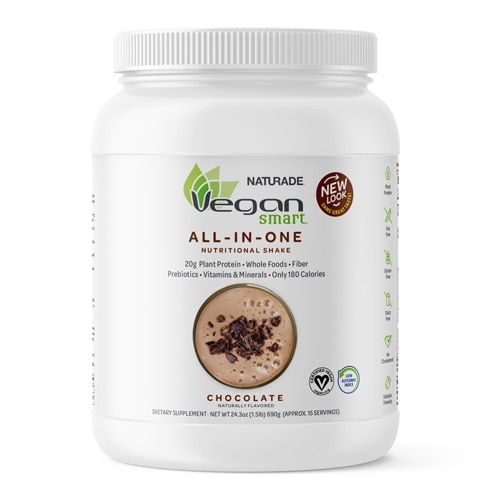When faced with the reality of systemic racial injustice, many people are not sure where to begin. One way to take a step in the right direction is to become more aware of BIPOC-owned businesses you can support. BIPOC stands for black, indigenous and people of color—and the acronym has been cropping up much more frequently in recent months.
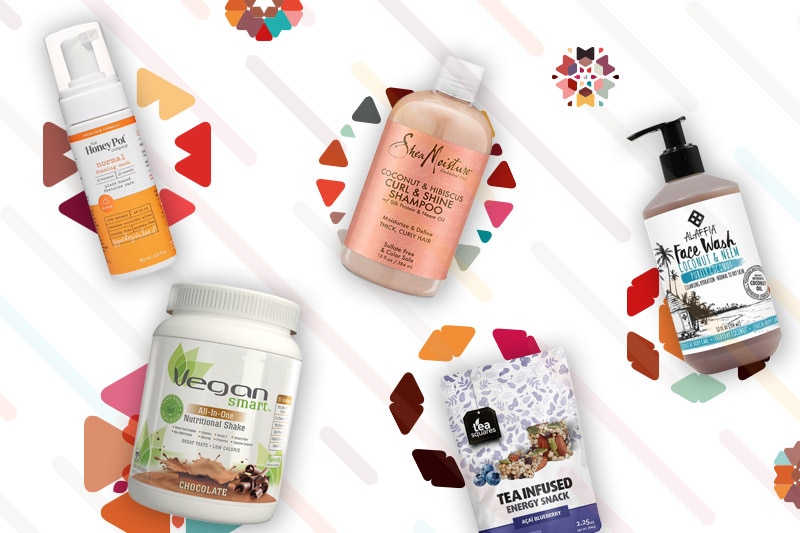
Google Trends reports that the use of the acronym began to spike in May 2020, coinciding with the growing Black Lives Matter movement in the wake of the deaths of George Floyd, Breonna Taylor and Ahmaud Arbery. Typically, POC (people of color) is the widely cited umbrella term, but the addition of Black and Indigenous people signifies that not all racism is equal. Black and Indigenous people in particular are significantly impacted by systemic racial injustices.
So, if you’ve heard the phrase “shop your values,” now’s your chance. The following 11 BIPOC-owned natural brands, all sold through Vitacost, offer not only innovative products but take their social stewardship seriously.
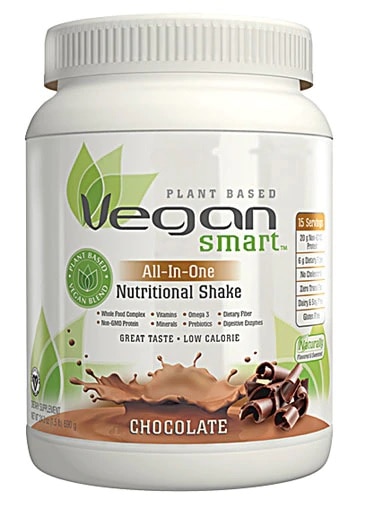
As origin stories go,
Naturade founders Kareem Cook and Claude Tellis had the inspiration to start a supplements brand after realizing how many people in their families suffered from diet-related illnesses, like obesity and diabetes.
Previously, they founded Healthy Body Products, a healthy vending machine company that’s mission was to provide healthier snack items to public schools. Within a year, they co-led a movement that resulted in a ban on junk food in the Los Angeles public schools.
Two years later they were awarded the vending machine contract for every public high school and middle school in Los Angeles. Flush with that success, they realized that they had to think bigger to really affect change on a global level – so they bought Naturade, a nutritional company founded in 1926, in 2012 for $8 million. The idea was to make a “Whole Foods” quality product accessible to a demographic that shopped at Walmart.
Social impact: Tellis and Cook realized the people who most needed quality nutritional products had the least access. To combat this crisis, their mission is to help underserved populations – especially those in black neighborhoods – eat better. The result was a line of nutritional products meant to make healthy living available to all people, regardless of their race or socioeconomic status.
Try: Naturade VeganSmart All-in-One Nutritional Shake, $28
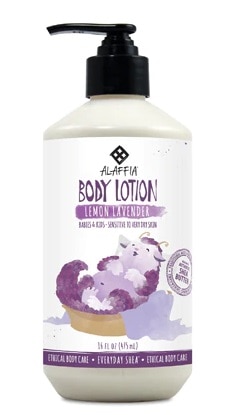 Alaffia
Alaffia founder and CEO Olowo-n'djo Tchala felt compelled to fight the gender inequality and poverty he witnessed growing up in the small village of Kaboli in Northern Togo, West Africa.
He wanted to reach his social justice goals through sustainable health, education and environmental initiatives. He founded Alaffia with Prairie Rose Hyde in 2003. He met Rose in his home village of Kaboli, Togo in 1996 where she was invited to serve as an environmental volunteer in the Peace Corp. In 2004, armed with his understanding of the value of indigenous West African resources and an understanding of sustainable business ideologies, they launched Alaffia's ?rst collective.
Alaffia continues to redefine the natural products industry through its values of beauty, equality and empowerment.
Social impact: Alaffia is heavily involved with ECOCERT, which created For Life, a label that demonstrates corporate responsibility. ECOCERT’s fair trade product certification, Fair for Life, includes many of Alaffia’s products with a primary base of shea or coconut. Fair trade certification ensures producers in economically disadvantaged countries receive a greater percentage of the price paid by consumers. As an example, Alaffia pays 15-25 percent above market price for shea nuts. Cooperative members also receive a salary up to four times greater than the average family income in Togo.
Try: Alaffia Body Lotion Lemon Lavender, $8
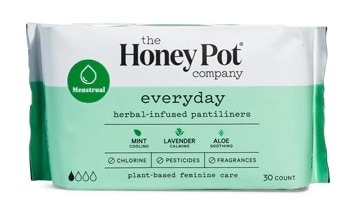
Bea Dixon was inspired to create
The Honey Pot after her own experience with bacterial vaginosis and her struggle to find relief. She says on the brand’s website, “One night, an ancestor visited me in a dream and gifted me with a vision to heal myself. With her help, I created the Honey Pot Co to solve for what other brands wouldn't, using the power of herbs.”
The company is a plant-based, black-owned feminine care brand founded by Dixon, one of the first 40 women of color to raise $1 million in venture capital. Today, it’s a multi-million dollar company that sells plant-based feminine care products, including affordable natural washes, wipes, tampons, panty sprays,
pads, lubricants and other herbal items.
Social impact: The Honey Pot believes that all humans with vaginas deserve menstrual care. To that end, they’ve partnered with Happy Period, an organization that provides menstrual hygiene kits to those who are homeless, low income or living in poverty.
Try: The Honey Pot Everyday Herbal Pantiliners, $7
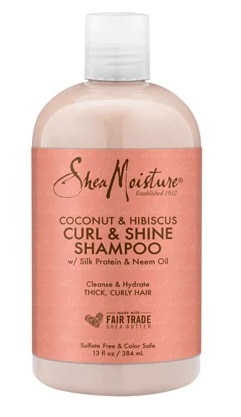
Sofi Tucker started selling Shea Nuts at the village market in Bonthe, Sierra Leone in 1912. By age 19, the widowed mother of four was selling Shea Butter, African Black Soap and her homemade hair and skin preparations all over the countryside.
In 1991, Liberians Nyema Tubman and Richelieu Dennis, Tucker’s grandchildren, founded
Shea Moisture in 1991. In 2015 and 2016, Shea Moisture was voted Overall Favorite Brand in Naturally Curly's annual Best of the Best survey. Since selling Sundial, the umbrella company that manufactures Shea Moisture and Nubian Heritage, to Unilever in 2017, Dennis has used his gains to invest in black women.
Social impact: According to Shea Moisture’s website, Dennis continues his mission of empowerment through Community Commerce, Sundial’s business model aimed at providing minority women with access to educational and entrepreneurial resources. For instance, they partner with women-run cooperatives in northern and southern Ghana that produce locally-sourced shea butter, African black soap and coconut oil.
This also includes women and girls in the United States, whom Sundial supports through mentorship and educational fellowships that focus on entrepreneurship, direct investments into their businesses, and other programs that help Sundial achieve its purpose of “empowering people to live more beautiful lives.”
Try: Shea Moisture Curl & Shine Shampoo Coconut & Hibiscus, $10
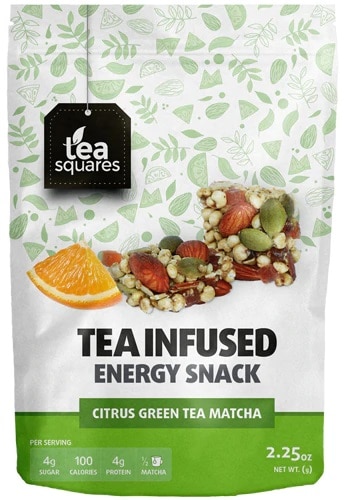
Jordan Buckner founded
Tea Squares in 2016, when he experienced a demanding work schedule that took a huge toll on his ability to focus. He realized what he really needed was a natural snack to help stay focused and energized, without the jitters or crash that accompanied coffee or energy drinks.
With a few friends, the 2018 Forbes 30 Under 30 recipient set out to create one himself. They realized that tea contains an energizing combination of naturally occurring caffeine and l-theanine, an amino acid that helps regulate the absorption of caffeine and reduce stress.
By infusing the snack bars with organic tea, they created a caffeinated energy snack that tastes good and keeps you focused. Tea Squares is now being sold in about 300 retail stores around Chicago.
Social impact: Tea Squares’ strong social mission translates into a fellowship program. Buckner partners with community organizations to find high-potential candidates, who will spend two to three months learning business, sales, and marketing skills from Buckner and his co-founder, and fellow Gies alumnus, Isaac Lozano (MBA ’16). The program helps these Fellows develop the tools and resources they need to pursue their own dreams. It’s a process Buckner hopes will eventually help boost the economy in the southside Chicago neighborhood where Tea Squares is located. Tea Squares also employs young adults from underserved communities throughout Chicago and partners with companies like Facebook and Google to help promote their diversity initiatives.
Try: Tea Squares Citrus Green Tea Matcha Energy Snack, $4
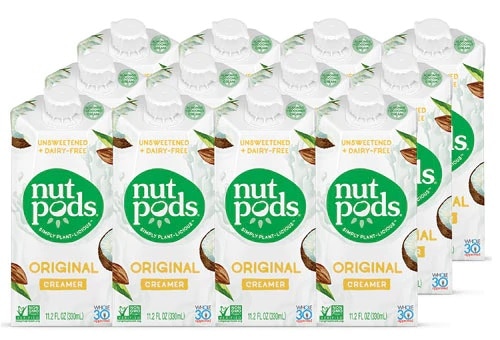
Madeline Haydon was on vacation, pregnant and frustrated with her non-dairy creamer options at a Lake Tahoe diner, when she resolved to commercialize her recipe for
Nutpods and start a business. Haydon said she started the fast-growing brand, Nutpods, a dairy-free creamer made from a blend of almonds and coconuts because the available creamers on the market could not accommodate her diet.
She has gestational diabetes, is lactose intolerant and was, at the time, pregnant. In 2013, Madeline perfected the commercial recipe and then brought the product to market in mid-2015. Nutpods was awarded “Editor’s Pick” at the Natural Products Expo in 2015.
Social Impact: Nutpod employees volunteer time at the International Rescue Committee, whose New Roots program focuses on food access and the nutritional needs of families upon arrival in the U.S. The program builds on the agricultural experience of many new refugee and immigrant families by providing access to land, materials, and education for program participants to grow healthy food. The company also donates to Seattle-based
VisionHouse, a Christian social service agency that helps break the cycle of homelessness for families with children.
Try: Nutpods Non-Dairy Creamer Unsweetened Original, $42 for 12
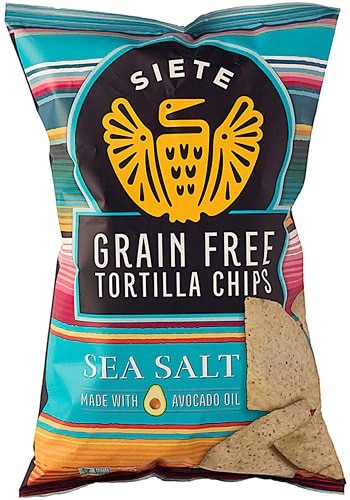
Siete launched in 2014 when Miguel Garza’s older sister, Veronica,
started making tortillas with almond flour. due to an autoimmune disease that forced her to remove all grain from her diet, she lived without tortillas for months. The rest of four siblings and her parents did so as well for moral support.
When her traditionally minded grandmother gave the tortilla her blessing, Miguel saw a business opportunity and started pitching tortillas to local grocery stores. In the years since, Siete has become a national success, and its full line of Mexican-American heritage-inspired foods, including queso, taco seasonings and
hot sauces, are stocked in more than 13,000 supermarkets across the country. Siete has become a part of just two percent of Latino-owned businesses doing north of $1 million in revenue a year.
Social impact: Siete Family Foods is a mission-based company, passionate about making and sharing real food, gathering in authentic community, and advocating for healthier lifestyles among Latino families. In early 2019,
Siete raised $90 million in funding through a deal with the Stripes Group, a private equity firm. This partnership and the brand’s growing popularity have set Siete up to be a conduit for philanthropic projects.
The Garzas donate products and a portion of proceeds to organizations like the Hispanic Impact Fund and Con Mi MADRE that benefit underserved communities. And as one of a few Latino-owned businesses in venture capital, they see it as their responsibility to lift up other minorities with a similar dream.
Try: Siete Grain Free Tortilla Chips, $5
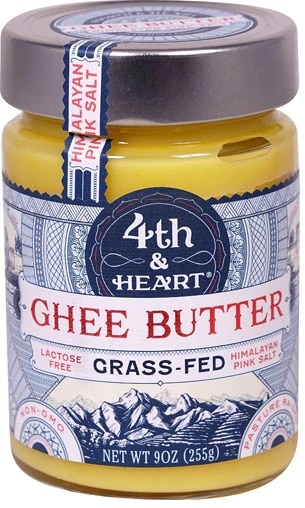
Raquel Tavares was born in Brazil and migrated at age six to Northern California in the early 80s with her mother and brother. She founded
4th & Heart to bring the wonders of ghee mainstream. Tavares had been out of the job market while she raised her two young boys with her husband. However, she started to feel restless and wanted to create a business that spoke to her love for healthy, holistic living.
Her
homemade flavored ghee had long been a staple in her family’s kitchen. Eventually, she realized her creation was a product that grocery stores were missing. Tavares launched the company in 2015 and just a year out from launch and one rebrand later, 4th & Heart closed a $1 million Series A on crowdfunding site CircleUp and in 2019 closed a $7.6 million series C funding round led by Harbinger Ventures, a leading growth-equity investment firm focused on scaling early-stage, female-led companies.
Social impact: 4
th & Heart donates part of their income to the organization Yoga Gives Back, whose mission is to raise awareness and funds in order to alleviate poverty in India. For example, the company gives micro loans to women so that their daughters can stay in school rather than have to help support the family through work.
Try: 4th & Heart Grass-Fed Ghee Butter, $11.50
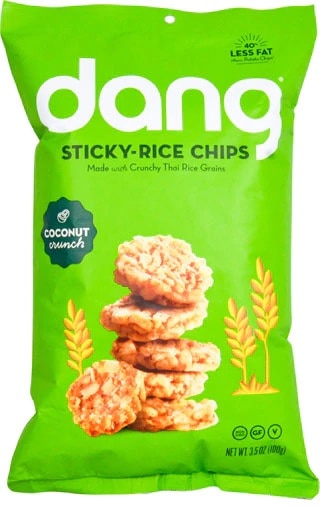
Founded in 2012 by two Thai-American brothers, Dang was inspired by an original recipe created by their mother. Vincent and Andrew Kitirattragarn weren’t trying to start a company – they were just trying to find a traditional ingredient to make one of Mama Dang’s delicious Thai recipes. They created Dang—???, “named after our Mom”—to share unique Asian-American snacks with flavors and ingredients they loved growing up. Dang’s selection includes their famous Coconut Chips, street-snack-inspired Thai Rice Chips and the keto-friendly Dang Bar.
Social impact: Dang’s mission is to support refugees and people affected by adverse environmental conditions, be that natural disasters or disease. In addition, their coconuts are sourced from family farms in Thailand. As a
Certified B Corp, Dang meets rigorous standards of environmental performance and public transparency, and all of their farms follow ethical business practices.
Try: Dang Gluten Free Coconut Crunch Sticky-Rice Chips, $4
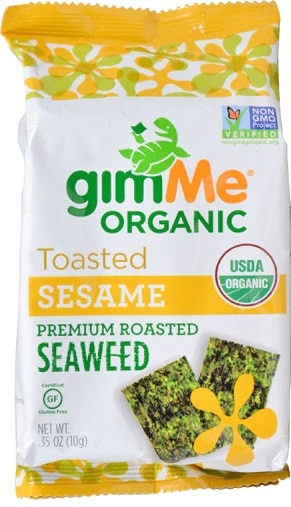
Annie Chun, founder of
GimME Health Foods (parent company of GimME Snacks), was born and raised in Korea. She founded her first Asian foods business in 1992 called "
Annie Chun's" ?where she starting developing seaweed-based product ideas. The business was purchased by CJ Corp for $6.8m in 2005. After selling her first company, she was inspired to do it all over again. In 2011, her family was sitting around the dinner table brainstorming when their teenaged daughter Mia had a great idea—start a company that sells the best possible roasted seaweed in delicious new flavors.
Social impact: Founders and visionary food entrepreneurs, Annie Chun and her husband and business partner Steve Broad, recognized an opportunity to adapt a traditional Korean snack to the US market. Their vision led to the creation of the world's first line of USDA Certified Organic and Non-GMO Project Verified seaweed snacks. Thanks to their commitment, other seaweed manufacturers are following suit helping to further reduce the amount of chemicals in our oceans.
Unlike conventionally grown seaweed, GimMe seaweed is naturally grown and tended by a passionate group of local farmers who are dedicated to preserving the integrity of the ocean's natural ecosystem. The company partners with and support numerous organizations, such as Sea Turtle Conservancy and Climate Collaborative, dedicated to protecting our most precious resources.
Try: GimMe Organic Toasted Sesame Seaweed Snacks, $2
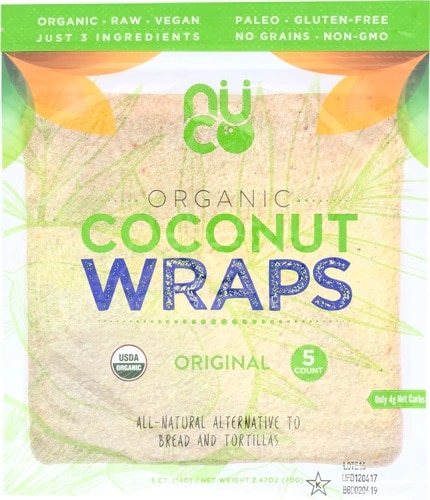
Ricky Santos grew up in the Philippines, mainly in the area of Metro Manila, where the coconut industry is vitally important to millions of its people. His family saw poverty and viewed firsthand the struggle of the Filipino coconut farmer. Although his family thrived, the desperate and unjust wages coconut farmers were paid tugged at their hearts. “We made it our mission to change and positively alter the economic landscape of the Filipino farmer,” Santos says.
As a result, he founded
Nuco in 2013, a brand that specializes in organic and natural coconut products. Coconuts are one of the chief exports of the Philippines and a significant part of the national economy. Many Filipino farmers depend on the coconut for their livelihood, and the impacts of changes in the coconut industry have far-reaching effects on people across the country.
Social impact: Nuco’s passion is to benefit the local Philippine coconut farmers through the sale of sustainably grown, organic and natural coconut products. The company only partners with mission-minded businesses that support local and global communities. One of these companies is Dignity Business Partners—a company dedicated to building “community transformational plants,” each of which will buy fresh coconuts from a network of 500-600 surrounding family farms and hire local plant operators from within the community.
A portion of Nuco’s profits goes directly to social, economic and environmental projects. The result is changing the economic landscape of the Philippines through business and job creation, strengthening community values, and improving their role as stewards of the land through modeling sustainability and care for the environment.
Try: Nuco Organic Coconut Wraps, $6.50
 Google Trends reports that the use of the acronym began to spike in May 2020, coinciding with the growing Black Lives Matter movement in the wake of the deaths of George Floyd, Breonna Taylor and Ahmaud Arbery. Typically, POC (people of color) is the widely cited umbrella term, but the addition of Black and Indigenous people signifies that not all racism is equal. Black and Indigenous people in particular are significantly impacted by systemic racial injustices.
So, if you’ve heard the phrase “shop your values,” now’s your chance. The following 11 BIPOC-owned natural brands, all sold through Vitacost, offer not only innovative products but take their social stewardship seriously.
Google Trends reports that the use of the acronym began to spike in May 2020, coinciding with the growing Black Lives Matter movement in the wake of the deaths of George Floyd, Breonna Taylor and Ahmaud Arbery. Typically, POC (people of color) is the widely cited umbrella term, but the addition of Black and Indigenous people signifies that not all racism is equal. Black and Indigenous people in particular are significantly impacted by systemic racial injustices.
So, if you’ve heard the phrase “shop your values,” now’s your chance. The following 11 BIPOC-owned natural brands, all sold through Vitacost, offer not only innovative products but take their social stewardship seriously.
 As origin stories go, Naturade founders Kareem Cook and Claude Tellis had the inspiration to start a supplements brand after realizing how many people in their families suffered from diet-related illnesses, like obesity and diabetes.
Previously, they founded Healthy Body Products, a healthy vending machine company that’s mission was to provide healthier snack items to public schools. Within a year, they co-led a movement that resulted in a ban on junk food in the Los Angeles public schools.
Two years later they were awarded the vending machine contract for every public high school and middle school in Los Angeles. Flush with that success, they realized that they had to think bigger to really affect change on a global level – so they bought Naturade, a nutritional company founded in 1926, in 2012 for $8 million. The idea was to make a “Whole Foods” quality product accessible to a demographic that shopped at Walmart.
Social impact: Tellis and Cook realized the people who most needed quality nutritional products had the least access. To combat this crisis, their mission is to help underserved populations – especially those in black neighborhoods – eat better. The result was a line of nutritional products meant to make healthy living available to all people, regardless of their race or socioeconomic status.
Try: Naturade VeganSmart All-in-One Nutritional Shake, $28
As origin stories go, Naturade founders Kareem Cook and Claude Tellis had the inspiration to start a supplements brand after realizing how many people in their families suffered from diet-related illnesses, like obesity and diabetes.
Previously, they founded Healthy Body Products, a healthy vending machine company that’s mission was to provide healthier snack items to public schools. Within a year, they co-led a movement that resulted in a ban on junk food in the Los Angeles public schools.
Two years later they were awarded the vending machine contract for every public high school and middle school in Los Angeles. Flush with that success, they realized that they had to think bigger to really affect change on a global level – so they bought Naturade, a nutritional company founded in 1926, in 2012 for $8 million. The idea was to make a “Whole Foods” quality product accessible to a demographic that shopped at Walmart.
Social impact: Tellis and Cook realized the people who most needed quality nutritional products had the least access. To combat this crisis, their mission is to help underserved populations – especially those in black neighborhoods – eat better. The result was a line of nutritional products meant to make healthy living available to all people, regardless of their race or socioeconomic status.
Try: Naturade VeganSmart All-in-One Nutritional Shake, $28
 Alaffia founder and CEO Olowo-n'djo Tchala felt compelled to fight the gender inequality and poverty he witnessed growing up in the small village of Kaboli in Northern Togo, West Africa.
He wanted to reach his social justice goals through sustainable health, education and environmental initiatives. He founded Alaffia with Prairie Rose Hyde in 2003. He met Rose in his home village of Kaboli, Togo in 1996 where she was invited to serve as an environmental volunteer in the Peace Corp. In 2004, armed with his understanding of the value of indigenous West African resources and an understanding of sustainable business ideologies, they launched Alaffia's ?rst collective.
Alaffia continues to redefine the natural products industry through its values of beauty, equality and empowerment.
Social impact: Alaffia is heavily involved with ECOCERT, which created For Life, a label that demonstrates corporate responsibility. ECOCERT’s fair trade product certification, Fair for Life, includes many of Alaffia’s products with a primary base of shea or coconut. Fair trade certification ensures producers in economically disadvantaged countries receive a greater percentage of the price paid by consumers. As an example, Alaffia pays 15-25 percent above market price for shea nuts. Cooperative members also receive a salary up to four times greater than the average family income in Togo.
Try: Alaffia Body Lotion Lemon Lavender, $8
Alaffia founder and CEO Olowo-n'djo Tchala felt compelled to fight the gender inequality and poverty he witnessed growing up in the small village of Kaboli in Northern Togo, West Africa.
He wanted to reach his social justice goals through sustainable health, education and environmental initiatives. He founded Alaffia with Prairie Rose Hyde in 2003. He met Rose in his home village of Kaboli, Togo in 1996 where she was invited to serve as an environmental volunteer in the Peace Corp. In 2004, armed with his understanding of the value of indigenous West African resources and an understanding of sustainable business ideologies, they launched Alaffia's ?rst collective.
Alaffia continues to redefine the natural products industry through its values of beauty, equality and empowerment.
Social impact: Alaffia is heavily involved with ECOCERT, which created For Life, a label that demonstrates corporate responsibility. ECOCERT’s fair trade product certification, Fair for Life, includes many of Alaffia’s products with a primary base of shea or coconut. Fair trade certification ensures producers in economically disadvantaged countries receive a greater percentage of the price paid by consumers. As an example, Alaffia pays 15-25 percent above market price for shea nuts. Cooperative members also receive a salary up to four times greater than the average family income in Togo.
Try: Alaffia Body Lotion Lemon Lavender, $8
 Bea Dixon was inspired to create The Honey Pot after her own experience with bacterial vaginosis and her struggle to find relief. She says on the brand’s website, “One night, an ancestor visited me in a dream and gifted me with a vision to heal myself. With her help, I created the Honey Pot Co to solve for what other brands wouldn't, using the power of herbs.”
The company is a plant-based, black-owned feminine care brand founded by Dixon, one of the first 40 women of color to raise $1 million in venture capital. Today, it’s a multi-million dollar company that sells plant-based feminine care products, including affordable natural washes, wipes, tampons, panty sprays, pads, lubricants and other herbal items.
Social impact: The Honey Pot believes that all humans with vaginas deserve menstrual care. To that end, they’ve partnered with Happy Period, an organization that provides menstrual hygiene kits to those who are homeless, low income or living in poverty.
Try: The Honey Pot Everyday Herbal Pantiliners, $7
Bea Dixon was inspired to create The Honey Pot after her own experience with bacterial vaginosis and her struggle to find relief. She says on the brand’s website, “One night, an ancestor visited me in a dream and gifted me with a vision to heal myself. With her help, I created the Honey Pot Co to solve for what other brands wouldn't, using the power of herbs.”
The company is a plant-based, black-owned feminine care brand founded by Dixon, one of the first 40 women of color to raise $1 million in venture capital. Today, it’s a multi-million dollar company that sells plant-based feminine care products, including affordable natural washes, wipes, tampons, panty sprays, pads, lubricants and other herbal items.
Social impact: The Honey Pot believes that all humans with vaginas deserve menstrual care. To that end, they’ve partnered with Happy Period, an organization that provides menstrual hygiene kits to those who are homeless, low income or living in poverty.
Try: The Honey Pot Everyday Herbal Pantiliners, $7
 Sofi Tucker started selling Shea Nuts at the village market in Bonthe, Sierra Leone in 1912. By age 19, the widowed mother of four was selling Shea Butter, African Black Soap and her homemade hair and skin preparations all over the countryside.
In 1991, Liberians Nyema Tubman and Richelieu Dennis, Tucker’s grandchildren, founded Shea Moisture in 1991. In 2015 and 2016, Shea Moisture was voted Overall Favorite Brand in Naturally Curly's annual Best of the Best survey. Since selling Sundial, the umbrella company that manufactures Shea Moisture and Nubian Heritage, to Unilever in 2017, Dennis has used his gains to invest in black women.
Social impact: According to Shea Moisture’s website, Dennis continues his mission of empowerment through Community Commerce, Sundial’s business model aimed at providing minority women with access to educational and entrepreneurial resources. For instance, they partner with women-run cooperatives in northern and southern Ghana that produce locally-sourced shea butter, African black soap and coconut oil.
This also includes women and girls in the United States, whom Sundial supports through mentorship and educational fellowships that focus on entrepreneurship, direct investments into their businesses, and other programs that help Sundial achieve its purpose of “empowering people to live more beautiful lives.”
Try: Shea Moisture Curl & Shine Shampoo Coconut & Hibiscus, $10
Sofi Tucker started selling Shea Nuts at the village market in Bonthe, Sierra Leone in 1912. By age 19, the widowed mother of four was selling Shea Butter, African Black Soap and her homemade hair and skin preparations all over the countryside.
In 1991, Liberians Nyema Tubman and Richelieu Dennis, Tucker’s grandchildren, founded Shea Moisture in 1991. In 2015 and 2016, Shea Moisture was voted Overall Favorite Brand in Naturally Curly's annual Best of the Best survey. Since selling Sundial, the umbrella company that manufactures Shea Moisture and Nubian Heritage, to Unilever in 2017, Dennis has used his gains to invest in black women.
Social impact: According to Shea Moisture’s website, Dennis continues his mission of empowerment through Community Commerce, Sundial’s business model aimed at providing minority women with access to educational and entrepreneurial resources. For instance, they partner with women-run cooperatives in northern and southern Ghana that produce locally-sourced shea butter, African black soap and coconut oil.
This also includes women and girls in the United States, whom Sundial supports through mentorship and educational fellowships that focus on entrepreneurship, direct investments into their businesses, and other programs that help Sundial achieve its purpose of “empowering people to live more beautiful lives.”
Try: Shea Moisture Curl & Shine Shampoo Coconut & Hibiscus, $10
 Jordan Buckner founded Tea Squares in 2016, when he experienced a demanding work schedule that took a huge toll on his ability to focus. He realized what he really needed was a natural snack to help stay focused and energized, without the jitters or crash that accompanied coffee or energy drinks.
With a few friends, the 2018 Forbes 30 Under 30 recipient set out to create one himself. They realized that tea contains an energizing combination of naturally occurring caffeine and l-theanine, an amino acid that helps regulate the absorption of caffeine and reduce stress.
By infusing the snack bars with organic tea, they created a caffeinated energy snack that tastes good and keeps you focused. Tea Squares is now being sold in about 300 retail stores around Chicago.
Social impact: Tea Squares’ strong social mission translates into a fellowship program. Buckner partners with community organizations to find high-potential candidates, who will spend two to three months learning business, sales, and marketing skills from Buckner and his co-founder, and fellow Gies alumnus, Isaac Lozano (MBA ’16). The program helps these Fellows develop the tools and resources they need to pursue their own dreams. It’s a process Buckner hopes will eventually help boost the economy in the southside Chicago neighborhood where Tea Squares is located. Tea Squares also employs young adults from underserved communities throughout Chicago and partners with companies like Facebook and Google to help promote their diversity initiatives.
Try: Tea Squares Citrus Green Tea Matcha Energy Snack, $4
Jordan Buckner founded Tea Squares in 2016, when he experienced a demanding work schedule that took a huge toll on his ability to focus. He realized what he really needed was a natural snack to help stay focused and energized, without the jitters or crash that accompanied coffee or energy drinks.
With a few friends, the 2018 Forbes 30 Under 30 recipient set out to create one himself. They realized that tea contains an energizing combination of naturally occurring caffeine and l-theanine, an amino acid that helps regulate the absorption of caffeine and reduce stress.
By infusing the snack bars with organic tea, they created a caffeinated energy snack that tastes good and keeps you focused. Tea Squares is now being sold in about 300 retail stores around Chicago.
Social impact: Tea Squares’ strong social mission translates into a fellowship program. Buckner partners with community organizations to find high-potential candidates, who will spend two to three months learning business, sales, and marketing skills from Buckner and his co-founder, and fellow Gies alumnus, Isaac Lozano (MBA ’16). The program helps these Fellows develop the tools and resources they need to pursue their own dreams. It’s a process Buckner hopes will eventually help boost the economy in the southside Chicago neighborhood where Tea Squares is located. Tea Squares also employs young adults from underserved communities throughout Chicago and partners with companies like Facebook and Google to help promote their diversity initiatives.
Try: Tea Squares Citrus Green Tea Matcha Energy Snack, $4
 Madeline Haydon was on vacation, pregnant and frustrated with her non-dairy creamer options at a Lake Tahoe diner, when she resolved to commercialize her recipe for Nutpods and start a business. Haydon said she started the fast-growing brand, Nutpods, a dairy-free creamer made from a blend of almonds and coconuts because the available creamers on the market could not accommodate her diet.
She has gestational diabetes, is lactose intolerant and was, at the time, pregnant. In 2013, Madeline perfected the commercial recipe and then brought the product to market in mid-2015. Nutpods was awarded “Editor’s Pick” at the Natural Products Expo in 2015.
Social Impact: Nutpod employees volunteer time at the International Rescue Committee, whose New Roots program focuses on food access and the nutritional needs of families upon arrival in the U.S. The program builds on the agricultural experience of many new refugee and immigrant families by providing access to land, materials, and education for program participants to grow healthy food. The company also donates to Seattle-based VisionHouse, a Christian social service agency that helps break the cycle of homelessness for families with children.
Try: Nutpods Non-Dairy Creamer Unsweetened Original, $42 for 12
Madeline Haydon was on vacation, pregnant and frustrated with her non-dairy creamer options at a Lake Tahoe diner, when she resolved to commercialize her recipe for Nutpods and start a business. Haydon said she started the fast-growing brand, Nutpods, a dairy-free creamer made from a blend of almonds and coconuts because the available creamers on the market could not accommodate her diet.
She has gestational diabetes, is lactose intolerant and was, at the time, pregnant. In 2013, Madeline perfected the commercial recipe and then brought the product to market in mid-2015. Nutpods was awarded “Editor’s Pick” at the Natural Products Expo in 2015.
Social Impact: Nutpod employees volunteer time at the International Rescue Committee, whose New Roots program focuses on food access and the nutritional needs of families upon arrival in the U.S. The program builds on the agricultural experience of many new refugee and immigrant families by providing access to land, materials, and education for program participants to grow healthy food. The company also donates to Seattle-based VisionHouse, a Christian social service agency that helps break the cycle of homelessness for families with children.
Try: Nutpods Non-Dairy Creamer Unsweetened Original, $42 for 12
 Raquel Tavares was born in Brazil and migrated at age six to Northern California in the early 80s with her mother and brother. She founded 4th & Heart to bring the wonders of ghee mainstream. Tavares had been out of the job market while she raised her two young boys with her husband. However, she started to feel restless and wanted to create a business that spoke to her love for healthy, holistic living.
Her homemade flavored ghee had long been a staple in her family’s kitchen. Eventually, she realized her creation was a product that grocery stores were missing. Tavares launched the company in 2015 and just a year out from launch and one rebrand later, 4th & Heart closed a $1 million Series A on crowdfunding site CircleUp and in 2019 closed a $7.6 million series C funding round led by Harbinger Ventures, a leading growth-equity investment firm focused on scaling early-stage, female-led companies.
Social impact: 4th & Heart donates part of their income to the organization Yoga Gives Back, whose mission is to raise awareness and funds in order to alleviate poverty in India. For example, the company gives micro loans to women so that their daughters can stay in school rather than have to help support the family through work.
Try: 4th & Heart Grass-Fed Ghee Butter, $11.50
Raquel Tavares was born in Brazil and migrated at age six to Northern California in the early 80s with her mother and brother. She founded 4th & Heart to bring the wonders of ghee mainstream. Tavares had been out of the job market while she raised her two young boys with her husband. However, she started to feel restless and wanted to create a business that spoke to her love for healthy, holistic living.
Her homemade flavored ghee had long been a staple in her family’s kitchen. Eventually, she realized her creation was a product that grocery stores were missing. Tavares launched the company in 2015 and just a year out from launch and one rebrand later, 4th & Heart closed a $1 million Series A on crowdfunding site CircleUp and in 2019 closed a $7.6 million series C funding round led by Harbinger Ventures, a leading growth-equity investment firm focused on scaling early-stage, female-led companies.
Social impact: 4th & Heart donates part of their income to the organization Yoga Gives Back, whose mission is to raise awareness and funds in order to alleviate poverty in India. For example, the company gives micro loans to women so that their daughters can stay in school rather than have to help support the family through work.
Try: 4th & Heart Grass-Fed Ghee Butter, $11.50
 Founded in 2012 by two Thai-American brothers, Dang was inspired by an original recipe created by their mother. Vincent and Andrew Kitirattragarn weren’t trying to start a company – they were just trying to find a traditional ingredient to make one of Mama Dang’s delicious Thai recipes. They created Dang—???, “named after our Mom”—to share unique Asian-American snacks with flavors and ingredients they loved growing up. Dang’s selection includes their famous Coconut Chips, street-snack-inspired Thai Rice Chips and the keto-friendly Dang Bar.
Social impact: Dang’s mission is to support refugees and people affected by adverse environmental conditions, be that natural disasters or disease. In addition, their coconuts are sourced from family farms in Thailand. As a Certified B Corp, Dang meets rigorous standards of environmental performance and public transparency, and all of their farms follow ethical business practices.
Try: Dang Gluten Free Coconut Crunch Sticky-Rice Chips, $4
Founded in 2012 by two Thai-American brothers, Dang was inspired by an original recipe created by their mother. Vincent and Andrew Kitirattragarn weren’t trying to start a company – they were just trying to find a traditional ingredient to make one of Mama Dang’s delicious Thai recipes. They created Dang—???, “named after our Mom”—to share unique Asian-American snacks with flavors and ingredients they loved growing up. Dang’s selection includes their famous Coconut Chips, street-snack-inspired Thai Rice Chips and the keto-friendly Dang Bar.
Social impact: Dang’s mission is to support refugees and people affected by adverse environmental conditions, be that natural disasters or disease. In addition, their coconuts are sourced from family farms in Thailand. As a Certified B Corp, Dang meets rigorous standards of environmental performance and public transparency, and all of their farms follow ethical business practices.
Try: Dang Gluten Free Coconut Crunch Sticky-Rice Chips, $4
 Annie Chun, founder of GimME Health Foods (parent company of GimME Snacks), was born and raised in Korea. She founded her first Asian foods business in 1992 called "Annie Chun's" ?where she starting developing seaweed-based product ideas. The business was purchased by CJ Corp for $6.8m in 2005. After selling her first company, she was inspired to do it all over again. In 2011, her family was sitting around the dinner table brainstorming when their teenaged daughter Mia had a great idea—start a company that sells the best possible roasted seaweed in delicious new flavors.
Social impact: Founders and visionary food entrepreneurs, Annie Chun and her husband and business partner Steve Broad, recognized an opportunity to adapt a traditional Korean snack to the US market. Their vision led to the creation of the world's first line of USDA Certified Organic and Non-GMO Project Verified seaweed snacks. Thanks to their commitment, other seaweed manufacturers are following suit helping to further reduce the amount of chemicals in our oceans.
Unlike conventionally grown seaweed, GimMe seaweed is naturally grown and tended by a passionate group of local farmers who are dedicated to preserving the integrity of the ocean's natural ecosystem. The company partners with and support numerous organizations, such as Sea Turtle Conservancy and Climate Collaborative, dedicated to protecting our most precious resources.
Try: GimMe Organic Toasted Sesame Seaweed Snacks, $2
Annie Chun, founder of GimME Health Foods (parent company of GimME Snacks), was born and raised in Korea. She founded her first Asian foods business in 1992 called "Annie Chun's" ?where she starting developing seaweed-based product ideas. The business was purchased by CJ Corp for $6.8m in 2005. After selling her first company, she was inspired to do it all over again. In 2011, her family was sitting around the dinner table brainstorming when their teenaged daughter Mia had a great idea—start a company that sells the best possible roasted seaweed in delicious new flavors.
Social impact: Founders and visionary food entrepreneurs, Annie Chun and her husband and business partner Steve Broad, recognized an opportunity to adapt a traditional Korean snack to the US market. Their vision led to the creation of the world's first line of USDA Certified Organic and Non-GMO Project Verified seaweed snacks. Thanks to their commitment, other seaweed manufacturers are following suit helping to further reduce the amount of chemicals in our oceans.
Unlike conventionally grown seaweed, GimMe seaweed is naturally grown and tended by a passionate group of local farmers who are dedicated to preserving the integrity of the ocean's natural ecosystem. The company partners with and support numerous organizations, such as Sea Turtle Conservancy and Climate Collaborative, dedicated to protecting our most precious resources.
Try: GimMe Organic Toasted Sesame Seaweed Snacks, $2
 Ricky Santos grew up in the Philippines, mainly in the area of Metro Manila, where the coconut industry is vitally important to millions of its people. His family saw poverty and viewed firsthand the struggle of the Filipino coconut farmer. Although his family thrived, the desperate and unjust wages coconut farmers were paid tugged at their hearts. “We made it our mission to change and positively alter the economic landscape of the Filipino farmer,” Santos says.
As a result, he founded Nuco in 2013, a brand that specializes in organic and natural coconut products. Coconuts are one of the chief exports of the Philippines and a significant part of the national economy. Many Filipino farmers depend on the coconut for their livelihood, and the impacts of changes in the coconut industry have far-reaching effects on people across the country.
Social impact: Nuco’s passion is to benefit the local Philippine coconut farmers through the sale of sustainably grown, organic and natural coconut products. The company only partners with mission-minded businesses that support local and global communities. One of these companies is Dignity Business Partners—a company dedicated to building “community transformational plants,” each of which will buy fresh coconuts from a network of 500-600 surrounding family farms and hire local plant operators from within the community.
A portion of Nuco’s profits goes directly to social, economic and environmental projects. The result is changing the economic landscape of the Philippines through business and job creation, strengthening community values, and improving their role as stewards of the land through modeling sustainability and care for the environment.
Try: Nuco Organic Coconut Wraps, $6.50
Ricky Santos grew up in the Philippines, mainly in the area of Metro Manila, where the coconut industry is vitally important to millions of its people. His family saw poverty and viewed firsthand the struggle of the Filipino coconut farmer. Although his family thrived, the desperate and unjust wages coconut farmers were paid tugged at their hearts. “We made it our mission to change and positively alter the economic landscape of the Filipino farmer,” Santos says.
As a result, he founded Nuco in 2013, a brand that specializes in organic and natural coconut products. Coconuts are one of the chief exports of the Philippines and a significant part of the national economy. Many Filipino farmers depend on the coconut for their livelihood, and the impacts of changes in the coconut industry have far-reaching effects on people across the country.
Social impact: Nuco’s passion is to benefit the local Philippine coconut farmers through the sale of sustainably grown, organic and natural coconut products. The company only partners with mission-minded businesses that support local and global communities. One of these companies is Dignity Business Partners—a company dedicated to building “community transformational plants,” each of which will buy fresh coconuts from a network of 500-600 surrounding family farms and hire local plant operators from within the community.
A portion of Nuco’s profits goes directly to social, economic and environmental projects. The result is changing the economic landscape of the Philippines through business and job creation, strengthening community values, and improving their role as stewards of the land through modeling sustainability and care for the environment.
Try: Nuco Organic Coconut Wraps, $6.50



